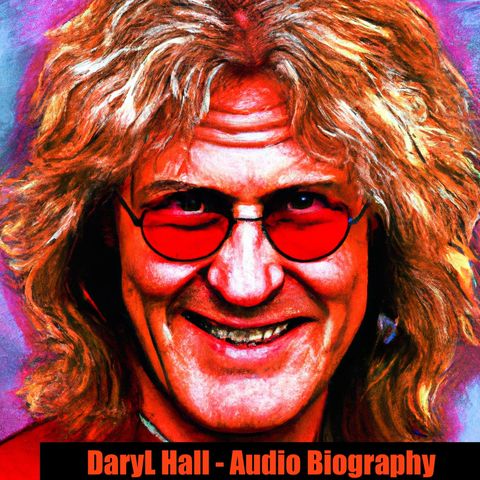8 DIC. 2023 · Singer, songwriter and musician Daryl Hall draws apt parallel to genre fluid visionary David Bowie, shifting between musical alter-egos almost manically over decades careers. For both transcended rigid industry boxes even at risk of commercial stakes because the art called louder. Where Bowie created theatrical personas like Ziggy Stardust vehicle for explosive glam expedition, Hall poured schizophrenic influences from Temptations soul to Led Zeppelin prog into smash pop blender alongside trusted creative partner John Oates. From the lush piano balladry of early Hall & Oates to synth-sheened ‘80s apex when they dominated radio and new media like MTV, Daryl dug into sonic possibilities restlessly. Six decades deep into still-unfurling legacy, we trace artistic highs, pop pressures and personal pains making the man. Blue-Eyed Soul Childhood & Teen Band Years Daryl Franklin Hohl was born on October 11, 1946 in rural Pottstown, Pennsylvania located outside Philadelphia known for breeding musicians from Todd Rundgren to Questlove’s father Lee Andrews. Surrounded by choral singer mother and jazz musician father, young Daryl absorbed sounds from gospel tones to classical strings by age 6 when taking piano lessons from local instructor Bertha Hall. Her last name and initial “H” he’d later adopt when moving to Philadelphia for early bands. Artistically adventurous from youth, Hall formed first working band The Temptones at age 14 playing soul/R&B covers. His clear tenor drew comparisons to The Temptations. After some college stints during mid-60s, he reconnected high school buddy and singer John Oates to found early abum act The Masters in 1967. Blending folk, rock, and vocal harmonies, they developed trademark symbiotic sound mixing Hall’s wide-ranging influences from The Band's Americana to The Young Rascals' blue-eyed soul. Early Solo Work to Hall & Oates Formation Before fully jelling as the famous Hall & Oates, Daryl Hall released obscure solo album Whole Oats in 1972 showcasing eclectic blend of original songs and sprawling covers like 10-minute Gershwin interpretation “It Ain’t Necessarily Soul”. Displaying little concern for commercial appeal, he chased artistic experimentation across folk, R&B and glam rock loosely stitched together by theatrical crooning. Though Atlantic Records swiftly severed contract due to poor sales from his freewheeling vision, the album epitomized singular artistic wanderlust driving early career. When Daryl Hall and John Oates concept solidified on breakthrough 1975 LP Whole Oats and single “She’s Gone”, the pieces organically fit Daryl's strengths. Hall handled most lead songwriting/vocal duty swirling R&B choreographed loosely to let live-off-the-floor jam moments and syncopated clavinet parts breathe. Oates filled space with chunky rhythm guitar freeing up Daryl's vocal runs and keyboard solos careening songs to dramatic emotional peaks before last second slick pop resolution. Mainstream Pop Dominance in 1980s Hall & Oates After consistent radio presence through late 70s, Hall & Oates exploded in 1980s video age cracking MTV playlists alongside Michael Jackson and Madonna with clever concept videos amplifying infectious blue-eyed funk/soul confections. Smashes like “Kiss on My List”, "You Make My Dreams Come True", "I Can't Go For That (No Can Do)" and sleek "Maneater" powered them to become decade's most successful duo selling out arenas globally. Even while riding high, Daryl continued exploring artistic diversions like collaborating with Dave Stewart of Eurythmics fame in side project You+Me echoing his early love for English folk rock. When MTV made Hall & Oates mega pop stars, he still chased muse toward classical/world music fusion sessions during commercial apex rather than playing cable channel game. His restless creative spirit resonates through quote: “The only person who can complete you, ultimately, is yourself. I write that song every time I sing it.” Challenges of Fame & Solo Renaissance Behind the scenes, Hall reportedly struggled with substance use issues and depression on arduous tours increasingly centered around greatest hits obligation. “I was the poster child for everything bad,” he reflected. After initially planning to retire the brand, he thankfully got encouragement from longtime co-pilot John Oates who valued artistic freedom over breakup. Still close collaborators today at 75 years old, their union underscores rarest pop harmony - brothers in music not bound by blood who inspire mutual growth even during painful chapter events like Daryl's messy public 2010 divorce after years living secluded. Recently while Daryl continues touring large venues with both his solo band and ever-in-demand Hall & Oates, his outlook matured into renaissance rediscovering creative passions without commercial burdens when producing streaming series Live from Daryl’s House. Early mentor Todd Rundgren and next generation soul stars like Chromeo or Smokey Robinson guested on the relaxed home sessions where insight and experience superseded chart numbers or pin-up visuals. Across the series and segments on TV programs like Live from the Artists Den, Hall returned to organic musical dialogues that first lit his restless spark so long ago as suburban PA teenager on improbable path toward icon. Thanks for Listening to Quiet Please. Remember to like and share wherever you get your podcasts.


